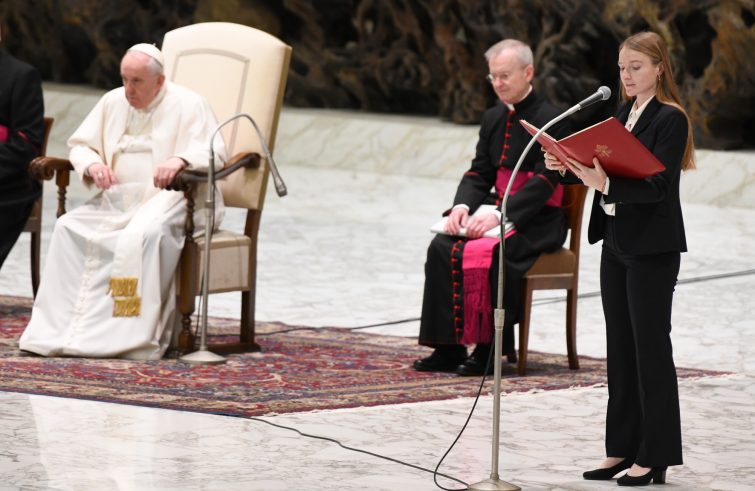
In a written message and a delivered speech Pope Francis yet again addressed the tragedy of the war in Ukraine. Most notably, he called on Europe to become an increasingly active promoter of peace, and on believers not to look the other way, especially with regard to the tragedy of migrants.
“We are used to hearing news of wars, but far away. Syria, Yemen… Now the war has come closer, it is on our doorstep, practically. And this makes us think about the “savagery” of human nature.”
The Holy Father spoke these words off-text before delivering his official address to participants at the International Congress “Educating for democracy in a fragmented world”, promoted by the Pontifical Foundation Gravissimum Educationis, underway at the LUMSA University in Rome until tomorrow. Responding to a letter read out earlier and written by Father Yurii Pidlisnyi, head of the Ukrainian Greek Catholic Church’s Commission for the Family and the Laity, head of the Chair of Political Science at the Ukrainian Catholic University and in charge of the project after which the congress was named, Francis asked:
“How far we are capable of going? Murderers of our brothers.”
“We think of so many soldiers who are sent to the front, very young,”, Francis continued, his voice conveying his emotion: “Russian soldiers, poor things. Think of the many young Ukrainian soldiers; think of the inhabitants, the young people, the young girls, boys, girls… This is happening close to us.” “The Gospel asks us not to look the other way, which is precisely the most pagan attitude of Christians”, Francis reminded the faithful: “The Christian, when he gets used to looking the other way, slowly becomes a pagan disguised as a Christian.” “The war is not far away: it is at our doorstep. A war is always – always! – the defeat of humanity. There is no such thing as a just war.”
“The tragedy of the war that is taking place in the heart of Europe leaves us astonished”,
the Pope wrote in a message sent to Msgr. Gintaras Grušas, Archbishop of Vilnius and president of the Council of the Bishops’ Conferences of Europe (CCEE), on the occasion of the opening of the European Catholic Social Days, ongoing in Bratislava until March 20: “Never would we have thought we would see such dramatic scenes again, reminiscent of the great wars of the last century. “The heartbreaking cry for help of our Ukrainian brothers and sisters impels us as a community of believers not only to engage in serious reflection, but to weep with them and do something for them; to share the anguish of a people whose identity, history and tradition have been wounded”, the Pope said:
“The blood and the tears of children, the suffering of women and men who are defending their land or fleeing from bombs challenge our conscience”, Francis remarked. “Humanity is once again threatened by a vicious abuse of power and vested interests, subjecting defenceless people to all forms of heinous violence”
Francis thus directed his words to the bishops: “I urge you to continue to pray that those who decide the fate of nations leave no stone unturned to stop the war and initiate constructive dialogue to end the immeasurable humanitarian tragedy it is causing.” The Pope went on voicing hopes for the Old continent:
“May war – which leaves our world worse than it was before and is a failure of politics and of humanity, a shameful capitulation before the forces of evil – provoke an opposite reaction, a commitment to re-establish an architecture of peace at the global level in which the European house, born to guarantee peace after the world wars, has a primary role,”
“We cannot stand idly by”, the Pope’s appeal: “as Christians and as European citizens, we are called to implement courageously what one of the great founding fathers of the European Community, Alcide De Gasperi, said when he spoke of ‘the common good of our European homelands, of our homeland Europe.” “Europe and the nations that compose it are not opposed to each other, and building the future does not mean unifying, but uniting even more in respect for diversity”, Francis’ exhortation: “For Christians, rebuilding the common house means becoming artisans of communion, weavers of unity at every level: not by stratagems but by the Gospel.”
“Those who love overcome fear and mistrust of those who come to our borders in search of a better life”, the Pope concluded: “if welcoming, protecting, accompanying, and integrating so many brothers and sisters fleeing from conflict, famine, and poverty is right and human, it is even more Christian. May the walls still present in Europe be transformed into doors of access to its heritage of history, faith, art, and culture; may dialogue and social friendship be promoted, so that human coexistence based on fraternity may grow.”
“When man denies his own vocation as a collaborator in God’s work and presumes to put himself in His place, he loses the dignity of son and becomes an enemy of his brothers”, the Pope said addressing participants at the Congress underway at LUMSA University.
“The common good is formed with love”, and “it cannot be defended by military force.”
“A community or nation that wants to assert itself by force does so to the detriment of other communities or nations, and becomes a fomenter of injustice, inequality and violence.”
“The path of destruction is easy to take, but it produces so much rubble”,
the Pope said referring to the war in Ukraine: “only love can save the human family. On this, we are living the ugliest example close to us. When authority goes beyond the rights of society, of people, it becomes authoritarianism and ultimately becomes dictatorship.”










